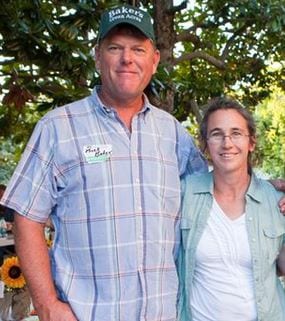
Mark and Jill Baker Photo Credit: Molly Peterson |
When heritage breed hog farmer Mark Baker was going through his four-year battle against the state of Michigan over his challenge to the Michigan Department of Natural Resources (DNR) Invasive Species Order (ISO), he contacted Missaukee County Sheriff James Bosscher, seeking Bosscher’s help over the harassment he was undergoing from DNR and the Michigan Department of Agriculture & Rural Development (MDARD). The sheriff refused to help Baker, a retired military veteran, not lifting a finger for him throughout the entire ordeal. Baker is now running for sheriff against Bosscher as an independent write-in candidate on the ballot. There is no opponent for the Democratic Party in the race.
The origin of Bakers’ fight with the state goes back to December 2010 when the DNR, with backing from the Michigan Pork Producers Association, issued an ISO prohibiting the possession of a number of breeds of swine. When asked to clarify what the ISO meant, DNR issued a declaratory ruling establishing that the determination of whether a pig violated the ISO was not going to be based on whether the pig was living in the wild or outside containment but rather on its physical characteristics. According to the declaratory ruling, a pig could be prohibited if it had either “curly or straight tail structure” or “either erect or folded/floppy ear structure.”
Baker, who raises heritage breed Mangalitsa pigs, filed a lawsuit challenging the constitutionality of the ISO shortly before the order went into effect in April 2012. DNR, through the state attorney general, responded to the lawsuit by filing a countersuit of its own, seeking to have Baker’s pigs condemned and destroyed for violating the ISO. Later, after Baker became publically critical of Michigan Attorney General Bill Schuette for his handling of the case, DNR amended its complaint and sought a court order fining Baker $700,000—$10,000 for each pig Baker owned that it claimed was illegal. Shortly after Baker filed his lawsuit, MDARD employees started contacting restaurants purchasing pork and other products from Baker intimidating them into dropping their business with the farmer; Baker lost almost all of his restaurant accounts. MDARD also worked with the U. S. Department of Agriculture (USDA) to inform slaughterhouses not to process “feral swine,” effectively limiting Baker’s access to those facilities.
Baker’s State Senator Darwin Booher said, “When Mark Baker retired from the Air Force after protecting our nation for 20 years, he never thought he would be fighting his own state government to protect his family’s livelihood. Unfortunately, that is what is happening now.”
After saying that Baker’s pigs were illegal for two years, DNR suddenly changed its position on his pigs just weeks before the case was to go to trial, resulting in the dismissal of both Baker’s lawsuit and DNR’s countersuit in February 2014. DNR changed its position because the agency didn’t want Baker to expose the declaratory ruling for the sham that it was at the trial. Several months after the case ended, DNR rescinded the declaratory ruling; the ISO is still on the books to this day.
Even though Baker’s case had ended with the result that his pigs were now legal, the state’s harassment of the farmer wasn’t over. In February 2015, DNR agents conducted a warrantless search of the farm while the Baker family was away. In December 2015, MDARD inspectors and state troopers descended on the farm to execute an administrative search warrant only to leave when Baker requested that they not start the search until some of the farmer’s friends arrived to observe the proceedings. Shortly before MDARD obtained the warrant, a government inspector had harassed the one restaurant still doing business with the farm, forcing him to destroy Baker’s Green Acres pork due to a bogus labeling violation claim. Many thought the farm had shut down its operation by the end of 2015, but according to the Mark Baker for Sheriff Facebook page, the farm is still selling pork and poultry products from animals raised on the farm.
Baker’s campaign platform in the race for sheriff boils down to his promise that he will protect the constitutional rights of the Missaukee County residents. He has stated he is running as an independent because he doesn’t want to be aligned with a political party, saying that party is of no relevance to the office. Baker has run a low-budget campaign in this race for sheriff, relying on his website and social media to get his message out.
There have been a couple recent cases of county sheriffs’ involvement with small farmers that have received national attention. In 2011, the U.S. Food and Drug Administration (FDA) was repeatedly inspecting the farm of raw milk producer David Hochstetler to gather evidence for a grand jury that was investigating Hochstetler for shipping raw milk across state lines. Elkhart County, Indiana Sheriff Brad Rogers intervened on Hochstetler’s behalf, sending the federal government written notice that any further attempts to inspect the Hochstetler farm without a warrant would result in federal inspectors’ removal or arrest for trespassing. The grand jury concluded its investigation without taking action against Hochstetler. Rogers was using the legal authority county sheriffs have to order personnel from a federal or state government agency off private property when the agency attempts to conduct a search without a warrant.
In 2014, the Cook County sheriff refused to assist inspectors from the Minnesota Department of Agriculture (MDA) possessing a warrant, in conducting an inspection of dairy producer Dave Berglund’s farm. MDA officials left without inspecting the farm; MDA was trying to stop Berglund from selling, among other things, raw butter and yogurt. The sheriff has the power to refuse to execute a warrant that is in the sheriff’s opinion unconstitutional or otherwise beyond the agency’s authority. Even if a warrant is valid, the sheriff can still insist that the agency contact the sheriff’s office before going to the farm and accompany the inspectors to the farm to make sure that the inspectors are not exceeding their authority granted by the warrant.
Baker has said that he will be vigilant at making sure that government regulators setting foot in Missaukee County honor private property rights. Those interested in getting updates on his campaign can go to MarkBakerforSheriff.com and Mark Baker for Sheriff Facebook page.
YOUR FUND AT WORK
 Services provided by FTCLDF go beyond legal representation for members in court cases.
Services provided by FTCLDF go beyond legal representation for members in court cases.
Educational and policy work also provide an avenue for FTCLDF to build grassroots activism to create the most favorable regulatory climate possible. In addition to advising on bill language, FTCLDF supports favorable legislation via action alerts, social media outreach, and the online petition service.
You can help FTCLDF by becoming a member or donating today.

 Anyone wanting to make a contribution to support the work of FTCLDF can make a donation online or send a check to:
Anyone wanting to make a contribution to support the work of FTCLDF can make a donation online or send a check to:
FTCLDF
8116 Arlington Blvd, # 263
Falls Church, VA 22042
Prefer to make a tax-deductible donation? Donate online at bit.ly/NFG4FTC.
You may also contact us by email at [email protected] or call 703-208-FARM (3276). Thanks for your support.